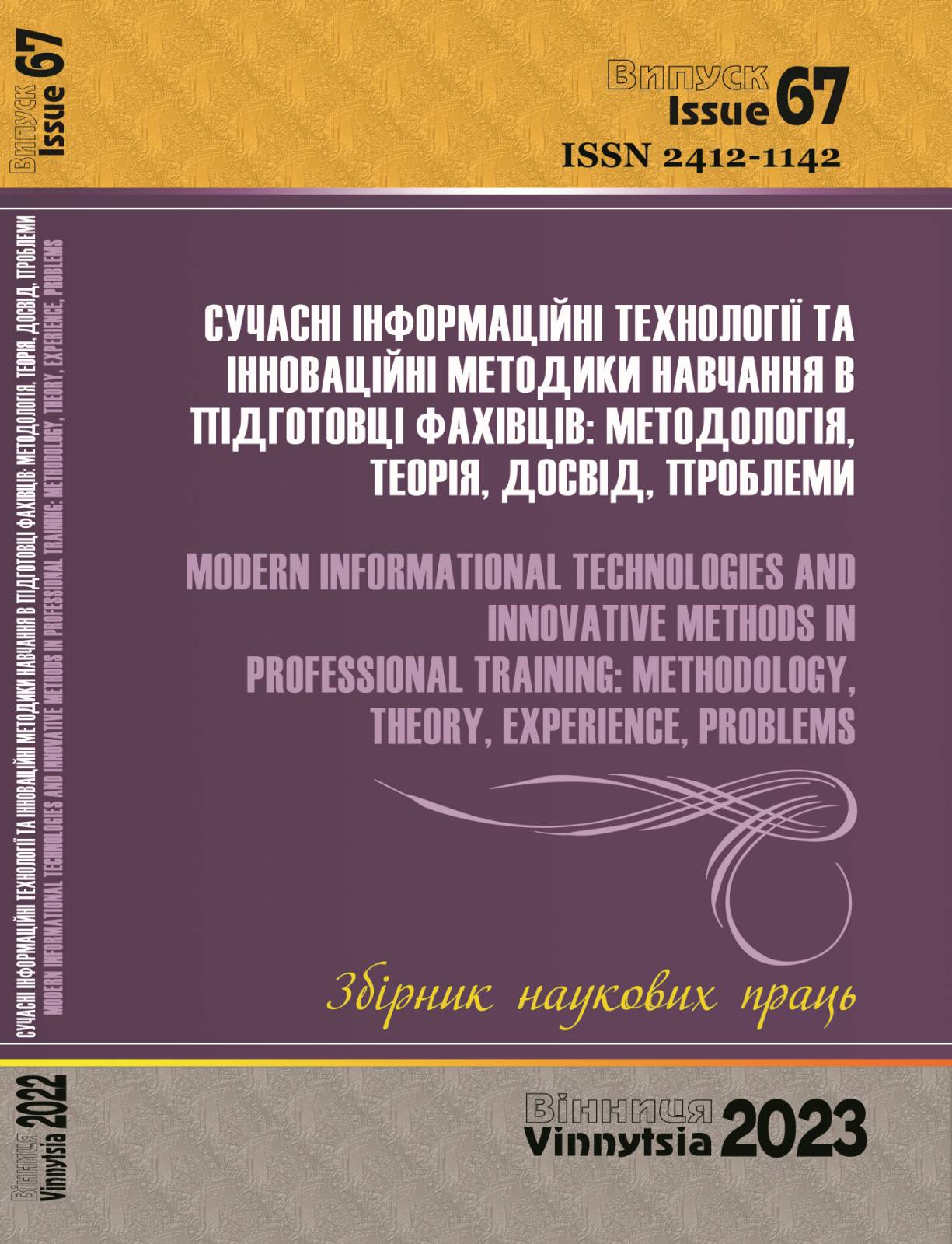SMART EDUCATION IN THE TRANSFORMATION DIGITAL SOCIETY
DOI:
https://doi.org/10.31652/2412-1142-2023-67-51-64Słowa kluczowe:
smart; smart society; smart education; smart learning; smart technologies; smart textbookAbstrakt
The issue of smart education in the transformation digital society is highlighted. The smart
society formation as the next stage of the digital society development is studied. It is established that in
the smart society there is a transition from the traditional learning model to e-learning, and then to smart
education. Smart education allows students to generate new knowledge and form a personality who is
well-versed in the information and computer technologies for searching, analyzing information and
creating innovations. The pecularitis of the smart education and the technologies with which it is
implemented are considered. It is noted that the concept of smart education assumes the elements in the education system that ensure rapid adaptation of the entire system to changing requirements, not only the
educational process. This is a complex development of educational services, including personnel support,
administrative and legal management, material and technical base and pedagogical design. The elements,
characteristics and conditions of the smart education implementation are given. The key task facing the
smart education is identified, which is to ensure the sustainable development of the society and the
economy in accordance with the changing environment, providing opportunities for creating a new level
of efficiency in the economy and public administration. An important factor of smart education is the
organization of feedback, in order to motivate students, save educational materials and records, also it is
necessary to create a cyber space for further joint use of resources.
The concept of smart technologies and the list of the main smart learning technologies used in higher
education are characterized. The requirements for smart technologies (availability, efficiency, economy,
aggregativity, complexity) are given.
The concept of a smart textbook, which should be the basis for a smart educational process, is
characterized, and the scheme of its development is given. The requirements for the technology of
creation and the foundations that are the basis of the smart textbook, the requirements for its content and
its structure are highlighted. The interactive environment of the smart textbook is defined.
It is concluded that smart education expands the perception of education in comparison with training;
goes beyond the technical developments; solves a greater number of educational tasks and satisfies more
diverse needs of social subjects.
Pobrania
Bibliografia
Ihnatenko M. Modern educational technologies.Matematyka v shkoli. 2013. № 4. S. 2-6. (in Ukrainian)
Voronkova V. H., Romanenko T. P., Andriukaitene R. The concept of project-oriented business development in
the conditions of digital transformation to a smart society. Humanitarnyi visnyk Zaporizkoi derzhavnoi
inzhenernoi akademii. Vyp. 67. S. 122-134. (in Ukrainian)
Myhovych S. M. Entry of Web 2.0 social services into educational activities. Mykolaiv. Dumka. 2011. 48 s.
(in Ukrainian)
Bykov V. Yu. Cloud computing technologies, ICT outsourcing and new functions of ICT departments of
educational and scientific institutions. Informatsiini tekhnolohii v osviti. 2011. № 10. S. 8-23. (in Ukrainian)
Lucaciu, L. O. (2018). A Look at the Evaluation Framework for Smart Growth Programmes. Revista
Romaneasca Pentru Educatie Multidimensionala, 10(3), 60-76. https://doi.org/10.18662/rrem/63 (in English)
Shakhina I. Yu., Podzygun O. A., Petrova A. I., Gordiichuk G. B. Digitalization as a prospective direction of the
contemporary education system. Suchasni informatsiini tekhnolohii ta innovatsiini metodyky navchannia v
pidhotovtsi fakhivtsiv: metodolohiia, teoriia, dosvid, problemy. 2022. Vyp. 63. pp. 65-77. (in English)
Ilina O. I. Formation of cognitive interest by means of an open SMART environment in the training of qualified
workers of vocational and technical institutions. Mahisterska robota. Vinnytsia. 2018. 156 s. (in Ukrainian)
Smart education: experience, realities, prospects: monohrafiia / za red. akad. R. S. Hurevycha: drukarnia «Dilo».
Vinnytsia. 2019. 218 s. (in Ukrainian)
Altinay, F., Dagli, G., Altinay, Z., & Altinay, M. (2020). Readiness to Online Learning: To Be A Smart
University. Revista Romaneasca Pentru Educatie Multidimensionala, 12(1Sup2), 09-14.
https://doi.org/10.18662/rrem/12.1sup2/241 (in English)
Humennyi, O., Radkevych, O., & Radkevych, V. (2021). An Environmental Approach to Developing and
Applying Smart Complexes of Academic Disciplines in Professional Training of Future Specialists. Revista
Romaneasca Pentru Educatie Multidimensionala, 13(2), 516-539. https://doi.org/10.18662/rrem/13.2/434
(in English)
Smart technologies in Ukraine and in the world. URL: http://molodi.in.ua/smart-tehnolohiji/ (in Ukrainian)
Organization of educational activities in a computer-oriented educational environment: posibnyk/av.: Zhuk Yu.
O., Sokoliuk O. M., Dementiievska N. P., Pinchuk O. P. /Za redaktsiieiu: Zhuka Yu. O. K.: Pedahohichna
dumka. 2012. 128 s. (in Ukrainian)
Formation of the personality of the future specialist in the terms of training for professional and pedagogical
activity: dialogue with stakeholders: monohrafiia / za red. akad. R. S. Hurevycha. Vinnytsia: TOV «Druk».
276 s. (in Ukrainian)
R. S. Gurevych, I. Y. Shakhina, and O. A. Podzygun (2020). Google classroom as an effective tool of smart
learning and monitoring of students’ knowledge in vocational schools. Information Technologies and Learning
Tools, 79(5). 59-72. https://doi.org/10.33407/itlt.v79i5.3651 (in English)
Shakhina I. Yu. To the issue of smart education. Aktualni problemy suchasnoi nauky i naukovykh doslidzhen:
zb. nauk. pr. Vyp. 10(13) /redkol.: R. S. Hurevych (holova) ta in... Vinnytskyi derzhavnyi pedahohichnyi
universytet imeni Mykhaila Kotsiubynskoho. Vinnytsia: TOV firma «Planer». 2019. S. 102-106. (in Ukrainian)
N. E. Kunanets, M. V. Nazaruk, R. M. Nebesnyi, and V. V. Pasichnyk (2018). Information technology of
personalized choice of profession in smart cities. Information Technologies and Learning Tools, 65(3). 277-290.
https://doi.org/10.33407/itlt.v65i3.2172 (in English)
K. I. Shykhnenko (2021). Clicker systems as a smart technology-based tool for teaching english to master’s
students majoring in public administration, Information Technologies and Learning Tools, 81(1). 297-309.
https://doi.org/10.33407/itlt.v81i1.3776 (in English)
Pobrania
Opublikowane
Numer
Dział
Licencja
Prawa autorskie (c) 2023 Шахіна Ірина Юріївна, Подзигун Олена Анатоліївна, Петрова Анастасія Іванівна, Гордійчук Галина Борисівна

Utwór dostępny jest na licencji Creative Commons Uznanie autorstwa 4.0 Międzynarodowe.





